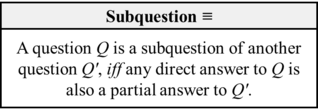Subquestion
What is subquestion? How should it be defined?
Questions can have subquestions. For instance, the question "Was Peter the Great an emperor of Russia?" is a subquestion of "Who were the emperors of Russia?", which is itself a subquestion of a broader question "Who were the rulers of Russia?". But what makes some question a subquestion of another question?
In the scientonomic context, this term was first used by Paul Patton and Cyrus Al-Zayadi in 2021. The term is currently accepted by Scientonomy community.
In Scientonomy, the accepted definition of the term is:
- A question Q is a subquestion of another question Q’, iff any direct answer to Q is also a partial answer to Q’.
Contents
Scientonomic History
Acceptance Record
| Community | Accepted From | Acceptance Indicators | Still Accepted | Accepted Until | Rejection Indicators |
|---|---|---|---|---|---|
| Scientonomy | 1 August 2021 | This is when Patton and Al-Zayadi's Disciplines in the Scientonomic Ontology hat offered a definition of the term was published. This is a good indication that the question of how the term is to be defined is considered legitimate by the community. | Yes |
All Theories
| Theory | Formulation | Formulated In |
|---|---|---|
| Subquestion (Patton-Al-Zayadi-2021) | A question Q is a subquestion of another question Q’, iff any direct answer to Q is also a partial answer to Q’. | 2021 |
If an answer to this question is missing, please click here to add it.
Accepted Theories
| Community | Theory | Accepted From | Accepted Until |
|---|---|---|---|
| Scientonomy | Subquestion (Patton-Al-Zayadi-2021) | 21 February 2024 |
Suggested Modifications
| Modification | Community | Date Suggested | Summary | Verdict | Verdict Rationale | Date Assessed |
|---|---|---|---|---|---|---|
| Sciento-2021-0006 | Scientonomy | 1 August 2021 | Accept new definitions of subquestion, core question, core theory, discipline, delineating theory, subdiscipline, and discipline acceptance. | Accepted | Prior to the 2024 workshop, Hakob Barseghyan commented on the encyclopedia indicating his support for accepting this modification and noted its potential to underpin further work on discipline dynamics. In fact, a significant amount of observational scientonomy work has been carried out in the past few years (including the paper on the rejection of alchemy by Friesen and Patton (2023),1 as well as some more recent papers) that presupposes the acceptance of these definitions, despite the fact that the modification containing them formally remains open. There was very little discussion about the modification, beyond raising points for the community to look forward to in the future, like a brief discussion between Jamie Shaw and Paul Patton about the need for more research on the difference between disciplines and disciplinary communities. The modification was accepted unanimously with 18 votes. | 21 February 2024 |
Current View
In Scientonomy, the accepted definition of the term is Subquestion (Patton-Al-Zayadi-2021).
Subquestion (Patton-Al-Zayadi-2021) states: "A question Q is a subquestion of another question Q’, iff any direct answer to Q is also a partial answer to Q’."
A question is a topic of inquiry.2 Questions can constitute hierarchies where more specific questions are subquestions of broader questions. For example, 'Was Peter the Great an emperor of Russia?' is a subquestion of 'Who were the emperors of Russia?' since by answering the former, we are also providing a partial answer to the latter. The latter is, in turn, a subquestion of the broader question 'Who were the rulers of European countries?'.3 A partial answer to a question is a complete, or direct, answer to one of its subquestions.456
Related Topics
References
- ^ Friesen, Izzy and Patton, Paul. (2023) Discipline Dynamics of Chymistry and Rejection of Alchemy. Scientonomy 5, 93-110. Retrieved from https://scientojournal.com/index.php/scientonomy/article/view/42268.
- ^ Rawleigh, William. (2018) The Status of Questions in the Ontology of Scientific Change. Scientonomy 2, 1-12. Retrieved from https://scientojournal.com/index.php/scientonomy/article/view/29651.
- ^ Patton, Paul and Al-Zayadi, Cyrus. (2021) Disciplines in the Scientonomic Ontology. Scientonomy 4, 59-85. Retrieved from https://scientojournal.com/index.php/scientonomy/article/view/37123.
- ^ Beck, Sigrid and Sharvit, Yael. (2002) Pluralities of questions. Journal of Semantics 19 (2), 105-157.
- ^ Beck, Sigrid and Sharvit, Yael. (2001) Subquestions and quantificational variability effects. In Megerdoomian and Bar-el (2001), 510-523.
- ^ Eckardt, Regine. (2007) 'Was noch?' Navigating in question answer discourse. In Spath (2007), 77-96.
